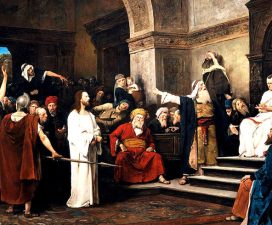7/6/2010 – Mark Tooley –
Predictably, Jim Wallis’s Religious Left Sojourners blog dishonored Independence Day by featuring an op-ed headlined “Why Christianity and July 4th are Incompatible.”
In it, a young pacifist pastor explained why Christians can’t “celebrate” having “killed thousands upon thousands of people because they [the British] were taxing us without giving us representation in parliament.”
Of course, the reasons for the American Revolution were far more complex than a tax dispute. As the Declaration of Independence summarized the former colonists’ grievances against their once monarch:
He has plundered our seas, ravaged our coasts, burned our towns, and destroyed the lives of our people.
He is at this time transporting large armies of foreign mercenaries to complete the works of death, desolation and tyranny, already begun with circumstances of cruelty and perfidy scarcely paralleled in the most barbarous ages, and totally unworthy the head of a civilized nation.
He has constrained our fellow citizens taken captive on the high seas to bear arms against their country, to become the executioners of their friends and brethren, or to fall themselves by their hands.
Prior to the outbreak of hostilities, the American colonists had already over a decade peacefully resisted various royalist schemes to tax and exploit them. The Declaration of Independence came after more than a year into the military conflict, and the Continental Congress had initially convened with hopes of reconciliation with Britain. The actual war did not begin until British troops unsuccessfully attempted to seize both the arsenal, and local leaders, of Massachusetts, in what resulted in the Battles of Concord and Lexington. Led by the royal governor, British troops attempted a similar plot in Virginia. After failing, Virginia’s royal governor retreated to a British royal ship and shelled various Virginia coastal towns, which hardly excited local support for the royal cause. St. Paul’s Episcopal Church in Norfolk still displays a British cannonball in its walls.
Animosity towards America’s founding by the Religious and Evangelical Left is perhaps best embodied by popular Anabaptist theologian Stanley Hauerwas. Guru to much of the Evangelical Left, he has pronounced July 4 one of history’s worst dates because of the ostensible arrogance of founding a nation upon a premise rather than a culture. The author of the Sojourners’ piece was young Mennonite Brethren minister Kurt Willems, who contemptuously asked in true Hauerwas style: “Is it honorable to kill because people don’t like being taxed?”
Mennonites, like most in the Anabaptist tradition, are historically pacifist. But their pacifism historically was primarily binding on themselves and not wielded as a sanctimonious and accusatory sword against the vast majority of Christians, and even against the state itself, for not equally bending to pacifism. Hauerwas’s anti-Americanism and infallible pacifism appeal to many on the Evangelical Left, who find it seductively subversive, despite its separatism from universal Christianity. It also generates a grossly distorted historical narrative, in which the United States is the paramount global villain, whose notions of “freedom” should be idolatrous to Christians.
“I challenge the idea that my freedom to choose came from our independence,” Willems insisted. “I am free to choose because God has given me a free will. Just like the Christians who suffered persecution during the first century and so on, I have the ability to choose because of the grace of God.” Well, it’s true that Christians always have the freedom of martyrdom. But absolute pacifism insists that even in the face of a genocidal holocaust, the faithful may only give non-violent witness. In contrast, nearly all of Christianity has always insisted on the state’s divine vocation to wield the sword against evil. And most of Christianity has asserted Christians’ own personal responsibility to defend the defenseless with more than their own martyrdom.
Superficially, Willems concluded: “Even if we had not separated ourselves from England, most likely it would have turned out pretty good.” After all, “Canada never revolted, and they are doing just fine.” He cited a decade old column by evangelical scholar Mark Noll, himself sometimes aligned with the Evangelical Left, who claimed the American Revolution failed to meet Christian Just War principles. According to Noll, Americans “fought a war to gain the kind of freedom that Canada, New Zealand, and Australia were simply given after not too many decades,” and establishing an “evil precedent” of America’s ignoring “classical Christian justifications for warfare.”
Commonly many on the Evangelical Left, claiming not to be pacifist, interpret Christian Just War criteria so tightly as to make all armed force morally impossible. But there is also the sometimes common assumption, almost unique to liberals in Anglo-American culture, that all will be well, regardless. Without exertion, America would have gently eased into independence and democracy like Canada. Likewise, the slaves would have been freed even without the Civil War, German expansionism, even Nazism, would have eventually deflated on its own, and the Soviet Union peacefully collapsed even without American resolve.
Human history is far more complex than progressive determinists assume. People of faith trust that Providence ultimately prevails. But traditionalists also know that Providence often permits evil to persist for long seasons, depending on human choices. Would Britain’s dominions have peacefully achieved their own democracy absent America’s example? Would Britain itself have expanded its own once highly limited franchise absent the American Revolution? Didn’t Britain’s own constitutional freedoms depend partly on the Glorious Revolution of 1688 and the parliamentary led civil war of the 1640s against the Stuart monarchy? Absent the American Revolution and subsequent British parliamentary reforms, would Britain have been spared the revolutionary violence that shook continental Europe for much of the early 19th century?
Only Providence truly knows. But America’s Founders understood that lawful freedom is an exception to human history, not the norm, and prevails only through great exertion and vigilance. British premier Lord Lansdowne, who negotiated Britain’s peace with the new United States, admiringly received and displayed Gilbert’s Stuart’s famous portrait of George Washington commissioned specifically for him. Lansdowne, like many British who cherished lawful freedom, understood the American Revolution was about significantly more than petty complaints about taxes.
Will Sojourners feature an anti-Bastille Day column later this month to excoriate the blood-soaked French Revolution, which facilitated much of modernity’s worst barbarities? In October, will Sojourners rail against the Bolshevik Revolution, whose totalitarian victory ultimately murdered tens of millions? Almost certainly not.
The historically unparalleled American Revolution, initiated reluctantly, and led by temperate and mostly Christian statesmen, created a republic that cherishes private property, personal liberty, free speech, and religious freedom. They believed in limited government because they knew that no state could replicate the Kingdom of God, as utopians so often disastrously insist. For this reason, among others, the Left, including the Religious and Evangelical Left, often uniquely despises the American Revolution and the incomparable republic it founded.



